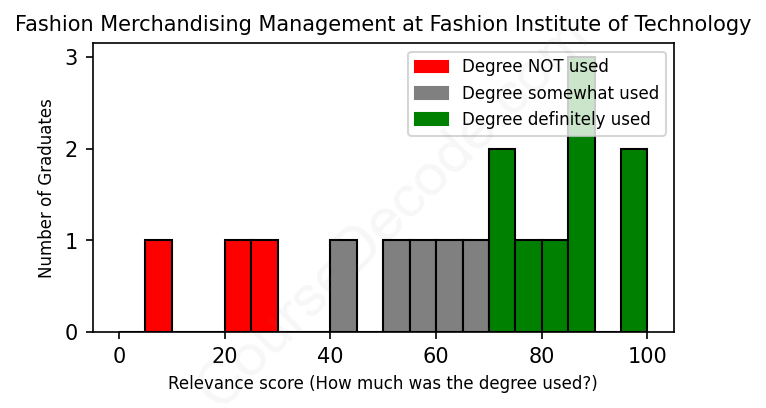
First, some facts. Of the Fashion Merchandising Management graduates from Fashion Institute of Technology we've analyzed , here's how many have used (or NOT used) their degree in their career:

These are estimates based on AI analysis of 17 LinkedIn profiles (see below).
The verdict? Slightly below average. Overall, with an average relevance score of 64%, Fashion Merchandising Management graduates from Fashion Institute of Technology have a slightly lower likelihood (-3%) of finding work in this field compared to the average graduate across all fields:
And for comparison, here's the chart for all profiles we've looked at across all degrees.
Also, after graduating, only 17% of these graduates have pursued further education other than another Bachelor's degree (such as a Masters degree or other), compared to the average across all profiles of 35%. This suggests a Bachelors degree is enough for most Fashion Merchandising Management graduates, and it's normal to look for work straight after graduation.
See the details:
|
Relevance score: 23% We think this person has NOT gone into a career related to their degree. We think this person has NOT gone into a career related to their degree.
DEGREE INFOGraduated in 2013 from Fashion Institute of Technology with a Bachelor of Applied Science (B.A.Sc.) in Fashion Merchandising Management. Also pursued further education since (see below). JOB HISTORY SINCE GRADUATIONSales Assistant ALVANON Jan 2013 - Jan 2013 Intern in Product Development for shoes and accessories  Calvin Klein Jan 2013 - May 2013 Sales Representative  Urban Expressions Aug 2013 - Present Freelance Medical Interpreter  Just Interpretation LLC Jan 2016 - Present Spanish Medical Interpreter  Memorial Sloan Kettering Cancer Center Oct 2019 - Present FURTHER DEGREES DONE SINCE GRADUATINGCertificate in Medical InterpretingCity University of New York-Hunter College 2015 - 2015 ABOUTNo information provided. |
The top 10 most common jobs done by the graduates we've analyzed (ranked most common to least) are:
When looking at the career paths of graduates from the Fashion Institute of Technology's Fashion Merchandising Management program, it's clear that many end up in roles like product development, merchandising, and sales management across various fashion-related industries. A significant number of them hold positions such as Account Executives, Merchandising Managers, and Product Development Associates at well-known brands. These roles often directly leverage the skills learned during their studies, such as understanding market trends, product positioning, and selecting the right assortments for different customer demographics. This is especially true in positions that focus heavily on merchandising strategies or product management, where a clear connection to their academic background in fashion merchandising is evident.
However, not every job listed falls neatly into the "fashion merchandising" category. Quite a few roles, like those in general operations or unrelated fields like finance and health, don't actively utilize the specific knowledge gained from their degrees. For example, positions like Senior Payroll Manager or Freelance Medical Interpreter show that not all graduates stick to the fashion industry. So, while many alumni find fulfilling careers that keep them relevant in the fashion world, there are also several who drift into roles that diverge from their original focus. Overall, there's a solid base of relevant careers for these graduates, but it's a mixed bag with various levels of connection to fashion merchandising management.
Here is a visual representation of the most common words in job titles for Fashion Merchandising Management graduates (this is across all Fashion Merchandising Management graduates we've analyzed, not just those who went to Fashion Institute of Technology):

Graduates from the Fashion Merchandising Management program at the Fashion Institute of Technology (FIT) tend to have pretty solid career trajectories, especially in the early stages of their careers. Many of them land internships right after graduation, often with major brands or well-known companies in the fashion industry, which helps them get their feet wet and start building professional networks. For instance, several graduates worked as interns for companies like Perry Ellis and Brooks Brothers, which transitioned into roles in merchandising, product management, and sales. Around five years after graduation, many of these individuals are advancing into mid-level positions, like account managers or brand merchandising managers, especially within the same or similar companies, indicating a good level of job retention and industry engagement. A decade later, many alumni have moved even further up the ladder, showing that those early investments in internships and entry-level roles paid off. They often reach senior management roles, contributing to significant brands like L'Oréal or Tory Burch.
However, not everyone stays within the fashion industry. A few graduates have transitioned into completely different fields, like finance or fitness, which might suggest that while the program equips students with relevant skills, it doesn't guarantee they will stick exclusively to fashion-related careers. Still, the majority seem to carve out successful paths that align with their degrees, suggesting a generally positive outlook for FIT graduates in fashion merchandising management. All in all, if you're considering this degree, it looks like you're setting yourself up for some exciting opportunities in the fashion world or beyond!
Getting a Bachelor’s degree in Fashion Merchandising Management at the Fashion Institute of Technology can be quite a challenge, but it's definitely doable if you're passionate about fashion and ready to put in the work. You'll be diving into a mix of creative and business courses, covering everything from trend analysis to marketing strategies, which can be demanding. Plus, there’s often a lot of group projects and presentations, so you'll need to collaborate well with others. Overall, it's probably a bit tougher than some other degrees due to the combination of creative thinking and business skills required, but if you're genuinely interested in fashion, it can also be super fun and rewarding!
Most commonly, in the LinkedIn profiles we've looked at, it takes people 4 years to finish a Bachelor degree in Fashion Merchandising Management.
Looking at the job histories of these Fashion Merchandising Management grads from FIT, it seems like they've been able to land some pretty solid jobs in the fashion industry, especially those who started their careers in roles like Account Executive or Merchandising Manager. Those who moved up to senior positions, like Area Sales Manager or VP of Sales, are likely making good money—definitely on the higher end for the industry. However, some of the earlier roles, like intern positions or entry-level jobs, probably didn’t pay as well. Overall, it looks like most of these grads have progressed in their careers and are doing pretty decently financially now, particularly if they stuck with it and climbed the ladder.
Here is a visual representation of the most common words seen in the "about" section of LinkedIn profiles who have a Bachelor degree in Fashion Merchandising Management (this is across all Fashion Merchandising Management graduates we've analyzed, not just those who went to Fashion Institute of Technology). This may or may not be useful:

Here are all colleges offering a Bachelor degree in Fashion Merchandising Management (ordered by the average relevance score of their Fashion Merchandising Management graduates, best to worst) where we have analyzed at least 10 of their graduates:
| College | Score | Count |
|---|---|---|
 Fashion Institute of Technology Fashion Institute of Technology
|
64 | 17 |